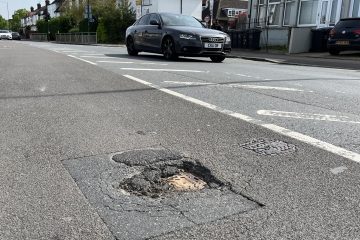
New car sales in the UK nosedived to their lowest level since 1946 during the month of April, figures released by the SMMT show.
Registrations fell 97.3% as the coronavirus pandemic shut dealerships and forced the public into a lockdown. Just 4,321 vehicles were sold, a drop of 156,743 units compared to the same period last year, marking a record low for the industry.
Many of the vehicles registered went to key workers and frontline public services. The decline was in line with similar drops across Europe, with France down 88.8%, Spain dropping 96.5% and Italy 97.5%. Germany, although steep, posted a drop of 61.1%.
Fleet orders represented by far the bulk of the market, taking 71.5% market share, equivalent to 3,090 units, while private buyers registered just 871 cars, a year on year fall of 98.7%. The distortion was reflected across all segments and fuel types, with the numbers of new petrol and diesel cars joining UK roads down 98.5% and 97.6% respectively, ironically marking the first time in two years that diesel performed better than petrol.
Plug-in hybrid vehicles (PHEVs) declined 95.1% and hybrids (HEVs) were down 99.3%. Meanwhile, the niche battery electric vehicles sector saw a smaller percentage decrease of 9.7%, as some pre-ordered deliveries of the latest premium models were able to be fulfilled.
Despite showrooms being closed for the month of April, companies managed to support key workers, critical companies and frontline services. Meanwhile, the industry has continued to keep service and repair workshops open to maintain vehicles that are so crucial in keeping key services, goods and people moving safely across the country.
The news comes as SMMT releases its latest new car market forecast for 2020, downgrading previous expectations to just 1.68 million registrations. This puts the sector on course to record its worst performance since 1992’s 1.59 million units, below the levels seen during the financial crisis and some -27% lower than the 2.31 million new cars registered in 2019. Despite this, the BEV market is expected to double in 2020 to 77,300 units as new model introductions bolster the market.
“With the UK’s showrooms closed for the whole of April, the market’s worst performance in living memory is hardly surprising,” said Mike Hawes, SMMT Chief Executive. “These figures, however, still make for exceptionally grim reading, not least for the hundreds of thousands of people whose livelihoods depend on the sector. A strong new car market supports a healthy economy and as Britain starts to plan for recovery, we need car retail to be in the vanguard. Safely restarting this most critical sector and revitalising what will, inevitably, be subdued demand will be key to unlocking manufacturing and accelerating the UK’s economic regeneration.”




You must be logged in to post a comment.